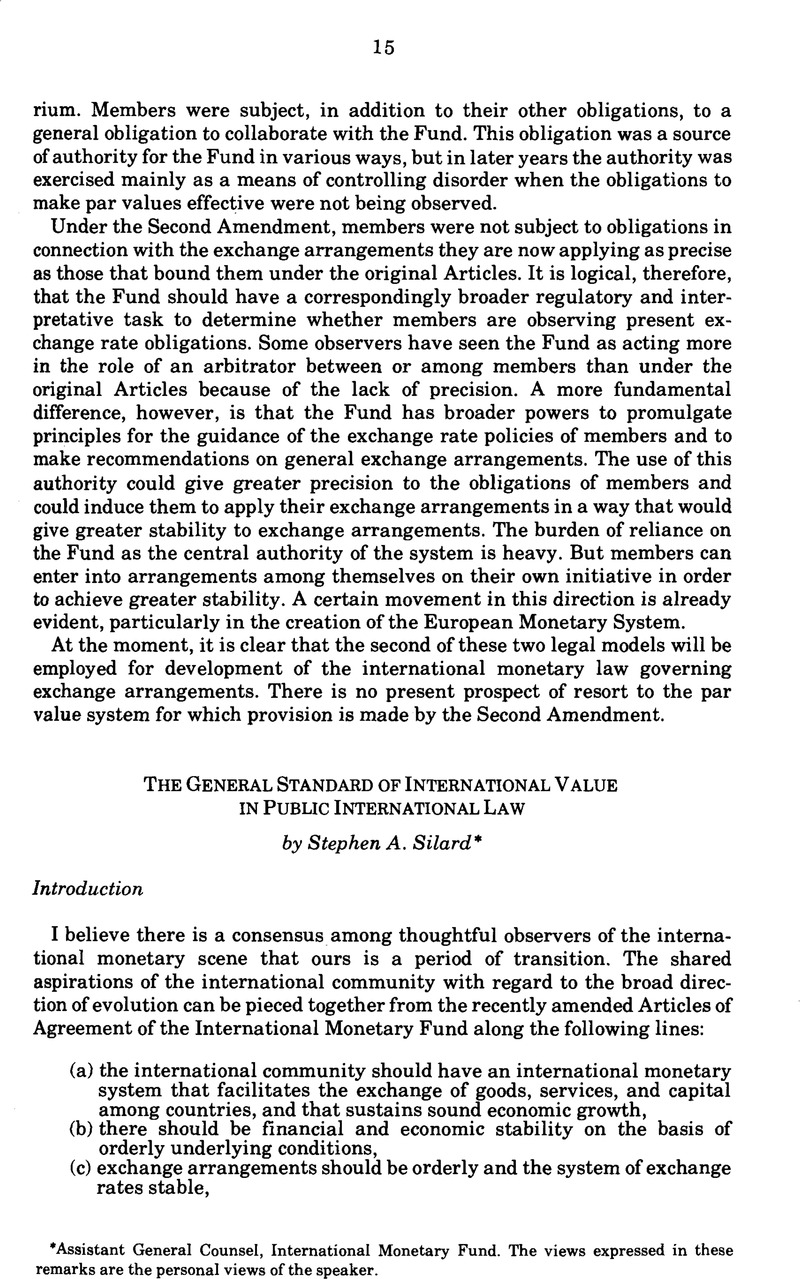No CrossRef data available.
Published online by Cambridge University Press: 28 February 2017

1 It is difficult at this time to predict the future of the European Currency Unit, except to point out that as a successor to the European Unit of Account, composed of a basket of fixed amounts of the nine EC currencies, the ECU will be a regional unit (in the sense of both being composed of currencies of the region and of being used in regional monetary and financial arrangements),and hence its usefulness is likely to be mostly regional. The unit may be used, however, in the external financial agreements of the region also (e.g the Lome Convention).The nature of the ECU is blueprinted by the Resolution of the European Council of December 5, 1978, which provides that: 2. The ECU and its functions 2.1 A European Currency Unit (ECU) will be at the centre of the EMS. The value and the composition of the ECU will be identical with the value of the EUA at the outset of the system.2.2 And the ECU will be used,(a) as the denominator (numeraire) for the exchange rate mechanism (b) as the basis for a divergence indicator (c) as the denominator for operations in both the intervention and the credit mechanism (d) as a means of settlement between monetary authorities of the EC.2.3 The weights of currencies in the ECU will be re-examined and if necessary revised within six months of the entry into force of the system and thereafter every five years or,on request, if the weight of any currency has changed by 25 per cent.Revisions have to be mutually accepted. They will, by themselves, not modify the external value of the ECU. They will be made in line with the underlying economic criteria.
2 The Fund is authorized by its amended Articles to make either SDR-denominated or currency-denominated investments for two special accounts that have not been made operational so far, namely the Special Disbursement Account and the Investment Account. Whether the power to make currency-denominated investment in such a way as to fail to maintain their SDR value would ever be exercised remains to be seen. If one may extrapolate from the Fund's experience with the Trust Fund that it administers for the benefit of developing countries, SDR denomination for any such investments appears to be the likeliest course.
3 Work is currently under way in the Fund on the consideration of ”an Account, to be administered by the Fund, that would accept deposits of foreign exchange from members of the Fund on a voluntary basis in exchange for an equivalent amount of SDR-denominated claims.The purpose of such an Account would be to take a further step toward making the SDR the principal reserve asset in the international monetary system.“ Press Communique of the Interim Committee of the Board of Governors of the International Monetary Fund, March 7,1979, par. 6.
4 See J. Gold., SDRs, Gold and Currencies: Third Survey of New Legal Developments, IMF Pamphlet No. 26 (1979) and Floating Currencies, SDRs and G old: Further Legal Developments,IMF Pamphlet No. 22 (1977); Silard, Carriage of the SDR by Sea: The Unit of Account of the Hamburg Rules, 10 J. Mar. L. Com. 13 (1978).
5 Decision No. 5718-(78/46)G/S, March 31, 1978; Selected Decisions of the International Monetary Fund and Selected Documents: Supplement to Eighth Issue, at 78-79 (1978).
6 The “Asian Monetary Unit” of the Asian Clearing Union equals SDR 1; but the Board of Directors may change its value by a unanimous decision (however, a director appointed by a participant whose currency has changed in SDR value at least equivalent to, and in the same direction as, the proposed change is deemed to vote in favor of the proposed change). This can happen even if the IMF does not change the method of valuation.
7 Draft OECD Financial Support Fund; a changed method of valuation would not apply unless the Governing Committee so decides by a qualified majority, but only if the change is compatible with a provision limiting the liability of members to their quota.
8 “If the Fund decides to make a change in the way in which the value of the unit of special drawing rights is determined, (i) [the lender] shall have the option to have the unit of value of the special drawing right in effect under Rule 0-3 before the change continue to apply for the purposes of this agreement; (ii) the Fund shall have the option to repay any amounts it is committed to repay, and to make repayment on the basis of the unit of value of the special drawing right in effect under Rule 0-3 before the change.” Decision No. 4242-(74/67), June 13,1974, Annex 1, par. 7 (Selected Decisions of the International Monetary Fund and Selected Documents, Eighth Issue, at 125 (1976)).
9 “If the Fund decides to make a change in the method of valuation of the special drawing right,[lender] shall have the option to require immediate repayment of all outstanding claims on the basis of the method of valuation in effect before the change.” If the lender exercises this option,“it shall have the further option to cancel this agreement.” Decision No. 5509-(77/127), August 29, 1977, Annex, paragraph 7 (Selected Decisions, Supplement to Eighth Issue, supra, n. 5, at 75 (1978)).